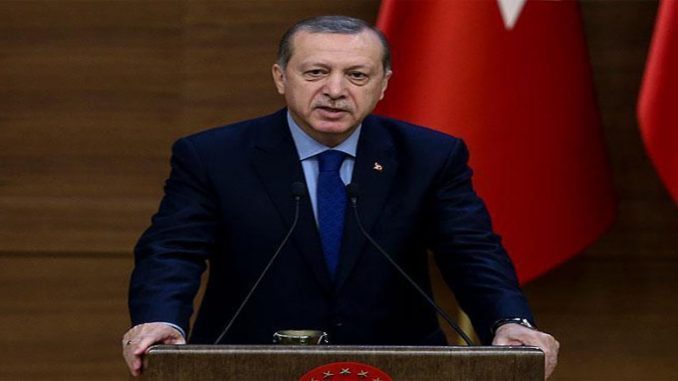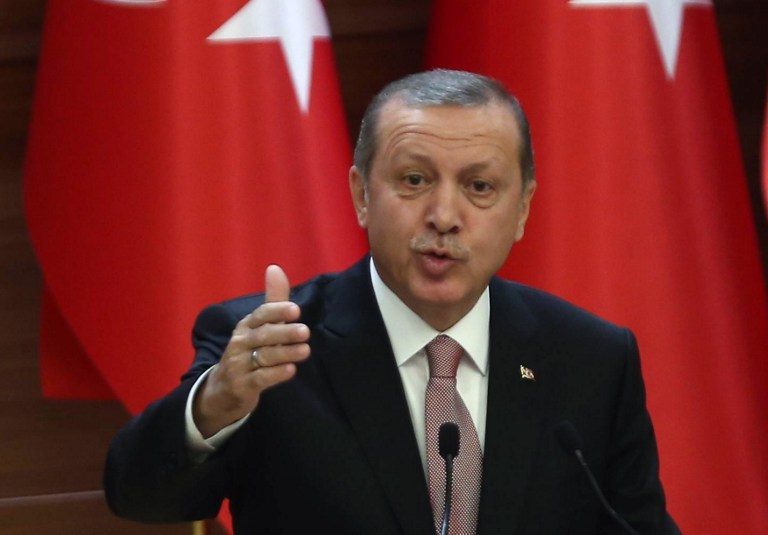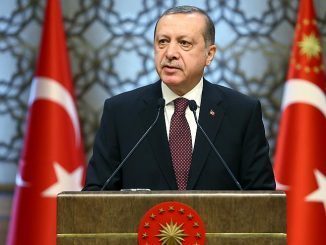
Constitutional changes concerning the call for a presidential system have been on the AK Party’s political agenda since President Erdogan was elected to his post in August 2014.
Turkey’s ruling party has recently received a major boost in pushing forward with a switch to an executive presidential system.
The Nationalist Movement Party and the Justice and Development Party have recently agreed to submit a proposal to parliament to amend the constitution and allow a shift to a presidential system.
The leaders of the ruling Justice and Development Party (AKP) and the opposition Nationalist Movement Party (MHP) have agreed to submit a charter draft, which grants more executive powers to President Recep Tayyip Erdoğan, to parliament next week, after the two leaders reviewed the text in a meeting on Dec. 1.
“The works we have conducted with the MHP have reached a certain level, and after the last review is made, God willing, the AKP will submit the proposal of the constitutional amendment to parliament next week,” Prime Minister and AKP leader Binali Yıldırım said after the meeting with MHP leader Devlet Bahçeli.
The two leaders gathered to discuss the constitutional amendment, including the shift to an executive presidential system, which was drafted by the AKP in line with the contributions of the MHP.
“We have made serious efforts to develop the text. The discussion today was positive in light of recent revisions,” the MHP’s leader said.
With 316 seats in parliament, the AKP needs at least 14 additional votes in the legislature to be able to take the constitutional amendment package to a referendum. With 40 seats, the MHP is poised to play a kingmaker’s role on the proposal.
Yıldırım said the text would be submitted for a parliamentary vote as “a text that the MHP and the AKP agreed on, negotiated and reconciled on,” so that the voting process would be taken accordingly.
“The style, writing and the form of the text needs a review. In that sense, our friends will finalize the text in one or two days by taking Mr. Bahçeli’s and our points into consideration,” Yıldırım said.
Though the constitutional amendment does not include the capital punishment, yet, Devlet Bahceli, the leader of the MHP, wants capital punishment to be restored and wants the proposal to be brought to a vote in parliament as soon as possible. So, the AKP plans to propose this to the MHP in a separate draft.
A referendum will tentatively be scheduled 60 days after the parliamentary vote if the amendment passes in parliament with more than 330 votes.
If such a case, the referendum is expected to be held early in the summer, Yıldırım said, adding that they did not plan to hold early elections.
CHP leader slams proposed constitutional amendments
Turkey’s main opposition Republican People’s Party (CHP) head Kemal Kılıçdaroğlu vowed to protect the parliamentary system in Turkey against “a government-supported shift to a presidential system”, speaking at a party rally in the southern province of Adana on Dec. 3.
“The philosophy that established our republic must be a value for all of us to uphold. The ones who built this republic paid a heavy price and fought for a better Turkey to leave to their children and grandchildren,” Kılıçdaroğlu said, vowing his commitment to protect the parliamentary system.
Erdogan: Presidential system to speed Turkey’s progress
President Recep Tayyip Erdogan, in a recent interview with Al Jazeera, said the advantage of a presidential system is that it would give Turkey the opportunity to develop much more rapidly. He said the U.S. and Russia are two important examples, although their working systems are different.
“Let’s establish a Turkish-style presidential system for Turkey. This will give Turkey an opportunity to develop much faster, so I defend it,” he said.
He added that Turkey failed in the period coalition governments ruled the country.
Presidential system for stability in Turkey, says PM
Constitutional change will result in trust and stability in Turkey, Prime Minister Binali Yıldırım said on Nov. 19.
“If there is political stability and trust in a country, then anything can happen,” he said at a hospital opening ceremony in Istanbul. “We are saying ‘Let’s come and make this constitutional change. Let’s make trust and stability permanent.'”
What are the amendments about and what kind of presidential system they suggests?
The AKP and the MHP have agreed in principle on a constitutional amendment that would implement what they’re calling a “Partisan Presidency.”
Responding to questions on the constitutional amendment, Yıldırım only revealed that the draft included a “Partisan Presidency,” meaning the president would be able to keep his links to a political party.
Prime Minister Binali Yildirim has also stated that “With this amendment, the president, if elected, would be able to keep his ties to a political party. This is the biggest change we would make.” The system is based upon one parliament and a unitary structure. The president, who will keep his ties to his party, will have a chance to be elected for a five year term, twice.
If the current proposal isn’t revised, the president will also be the head of government with this new system. The president will take on the prime minister’s duties and there won’t be a prime minister.
Şentop: President will undertake PM’s authorities
Sharing the details of the presidential system designed in the new constitutional amendment, Mustafa Şentop, the parliamentary constitution committee head, said the president would undertake all the authorities of the prime minister and the cabinet.
“The president in today’s system, the prime minister and the government will be equal to the new president in the new system of government.” he told state-run Anadolu Agency on Dec. 1.
“The president and the government will not have the authority to submit draft laws; only the lawmakers will have the authority to submit proposals of the draft law,” he said, adding that the president would have the authority to issue a decree law and veto the draft laws issued by the parliament.
How will the parliament handle the amendments?
The parliament will act according to Article 175 of the constitution. The AKP will put a constitutional amendment proposal before parliament. For the amendment to be passed, 330 “yes” votes must be reached in a secret ballot. After President Erdogan approves the draft, it is expected to be put to a referendum for public approval. The AKP government stated that the referendum could be held in April 2017. If it passes the referendum, it will become law.



